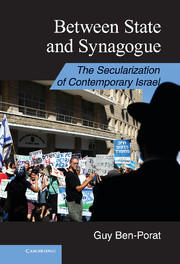7 - Conclusions
Published online by Cambridge University Press: 05 January 2013
Summary
The unpacking of secularization attempted here allows us to come to terms with its inconsistencies and contradictions. This unpacking includes distinguishing secularization as a process from secularism as an ideology; measuring secularization in the decline of religious authority; accounting also for non-ideological forces behind the process; observing the unfolding of secularization in a bricolage of inconsistent changing beliefs, practices, and affiliations; recognizing that the outcomes of secularization depend on particular, local conditions; looking for secularization also outside formal political process; and being skeptical regarding the relation between secularization as a process and a tolerant liberal society as its outcome.
As this account of the secularization of Israel has demonstrated, ideology and political struggles explain only part of the changes that have occurred in the past two decades. Civil marriage, civil burial, shops selling pork, and the rapidly expanding commerce on the Sabbath are all evidence for a secularization process unfolding in Israel since the early 1990s. During the same period, however, not only have religious parties and institutions continued to hold formal power, but many Israelis have also declared that they feel closer to religion than ever before and take part in different religious activities. Moreover, when this book was written, women in Israel were still prevented from eulogizing in some state cemeteries and religious leaders order their disciples serving in the military to refuse to serve alongside women and to leave the room when women singers appear. These are just a few examples that demonstrate that Israel, in spite of secularization, is nowhere close to being a secular state or society.
- Type
- Chapter
- Information
- Between State and SynagogueThe Secularization of Contemporary Israel, pp. 213 - 228Publisher: Cambridge University PressPrint publication year: 2013



